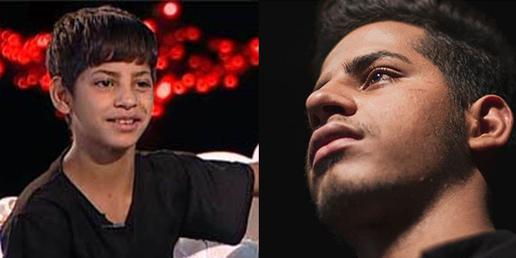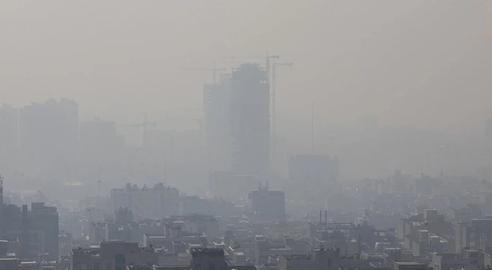They did not teach him to dream, so in many ways, suicide might have been predictable or expected.
This is the simplest way to describe the story and life of Reza, a former child laborer. Reza appeared on a television show six years ago aired by Islamic Republic of Iran Broadcasting (IRIB), and the remarks he made on the program were widely reported in the media at the time. Now, having killed himself at the age of 18, he has made headlines again.
Six years ago, Reza appeared on the program Honeymoon. When the presenter of the show, Ehsan Alikhani, asked him what he wished for, he said: "I have no wishes, because I work from morning to night; I don’t have time to dream."
On Monday, January 4, 2021, Iranian House on the Edge of the Line, a group supporting working children, posted the news of Reza's suicide on its Instagram page. Following this, a video of Reza's appearance on Honeymoon was published and shared hundreds of times on social media.
He had been invited to the program as a "working child,” and he told the Honeymoon audience he was, at the age of 12, the head of and breadwinner for his family. Many people remembered his comments about having no dreams, though Reza himself faded from public memory. Just like many other child laborers whose stories have occasionally been covered by IRIB and other media, he was left to fend for himself after the show was broadcast.
On social media, many people said the IRIB had been irresponsible: it turned public attention to the issue of child labor, enjoyed a spike in viewer numbers, and then never followed up on the subject, leaving Reza and others like him marginalized and ignored once again. Some argued that the IRIB and other media, companies and organizations that use working children in any way to advance their goals should support these vulnerable individuals to prevent suicide and other tragic events. Others argued that a child’s face should not be shown on television and pointed to the psychological trauma inflicted on them by such practices.
In recent years, with the introduction of terms such as "working children" in the Iranian social dictionary, videos of inhuman treatment of these children have been published many times.
Earlier, in January 2019, Kerman municipal agents forced two child laborers to put the flowers they were planning to sell in their mouths and eat them.
In December 2019, a video of a man throwing a child in a public waste bin and then laughing at what he had done surfaced on social media, prompting widespread condemnation online.
In an even more serious example of cruelty, in November 2020, another video was released showing a man forcing two children working as fortune tellers to dance in front of the camera and expose their genitals.
Generally, the IRIB and other media have initially reached out to these children, appeasing them with bouquets of flowers and other gifts, insinuating that, by publishing these images, the problems of these children had come to an end.
However, these consolations and shows of supports are short-lived, as Reza's invitation to appear on Honeymoon followed by six years of silence and negligence shows.
The Honeymoon program has been repeatedly criticized for its focus on eliciting emotional responses from its audience, but it is one of many shows with the same focus. When the IRIB stayed silent after its initial report of the death, posts on social media read: "What caused this event? Who is responsible for it? Why are the IRIB and Ehsan Alikhani silent? Why do we have to hear about crime, suicide, and execution every day?"
Another post read: "At the time when he came to talk on television, why didn't anyone listen? Why didn't they follow him? Why did they not help him? They just brought him on to see people cry? Why didn't they take his hand and take him to an organization that would help him so that he did not commit suicide? It was a murder everyone watched and no one helped."
The Society of Students Against Poverty [the Imam Ali Association], a non-governmental organization that supports working children, said in a statement: "We are shocked by the volume of this darkness, which cannot be washed away through any effort.” It pointed to multiple incidents in which children lose their mothers, including because families have become refugees in desperation. “Mothers lose their children,” it continued. “and we lose both.”
Mostafa Tajzadeh, a political activist, also posted about Reza's suicide: "Shame on us for establishing a system in which an adolescence has no opportunity to dream and kills himself in his youth."
Journalist Nima Cheraghi published a photo of Ehsan Alikhani, along with the comment: "Ehsan Alikhani, who so quickly and enthusiastically supported Isa Alkasir and his controversial move [the football player was given a six-month ban for making a racist gesture], has no idea about Reza's suicide? How many times did you call Reza after the Honeymoon program? How many officials are thinking about this suicide now? How many politicians in the Islamic Republic of Iran care about the fact that Reza committed suicide?"
Another on Twitter wrote: "I am sad for the suicide of this teenager. The IRIB, the movies, Ehsan Alikhani, [filmmaker] Majid Majidi, etc. use these children for their own progress and fame, and then, even though they ask about their dreams, they still abandon them. Shame and curses are not enough for you!"
visit the accountability section
In this section of Iran Wire, you can contact the officials and launch your campaign for various problems


























comments